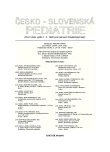Human Genome, Monogenic Diabetes Mellitus and Our Paediatric Patients
Lidský genom, monogenní diabetes mellitus a naši dětští pacienti
Poznatky molekulární genetiky posledních 10–15 let pomohly porozumět řadě forem diabetes mellitus, způsobených defektem jediného genu. Mezi vzácné monogenně podmíněné formy autoimunitního diabetes mellitus patří APECED a IPEX syndromy. Monogenně podmíněné vrozené defekty funkce beta buněk zahrnují velmi častý defekt glukokinázy (MODY2), vzácný defekt podjednotky kaliového kanálu Kir6.2 spojený s permanentním neonatálním diabetem a poměrně časté defekty některé ze složek transkripční regulační sítě beta buněk („diabetes transkripčních faktorů“ – MODY1, 3, 4, 5 a 6). Mezi diabetes způsobený defektem jediného genu v širším slova smyslu patří i diabetes mellitus při cystické fibróze, DIDMOAD neboli Wolframův syndrom a diabetes při defektu mitochondriální DNA.
Přesné zařazení příčiny diabetu může některým pacientům přinést nové, atraktivnější možnosti léčení. Každý diagnostikovaný pacient také přispívá k obecnému poznání funkce beta buňky, jedné z nejdokonaleji funkčně strukturovaných buněk lidského těla.
Klíčová slova:
diabetes mellitus, APECED, IPEX syndrom, glukokináza, Kir6.2, MODY
Authors:
J. Lebl 1; Š. Průhová 1; D. Čiháková 1,2; E. Feigerlová 1; D. Pintérová 3; K. Kološtová 3
Authors‘ workplace:
Klinika dětí a dorostu 3. LF UK a FN Královské Vinohrady, Praha
přednosta prof. MUDr. J. Lebl, CSc.
1; Department of Pathology, Johns Hopkins University, Baltimore, Maryland, USA
vedoucí prof. N. R. Rose, M. D., Ph. D.
2; Oddělení buněčné a molekulární biologie 3. LF UK, Praha
vedoucí doc. RNDr. J. Kovář, DrSc.
3
Published in:
Čes-slov Pediat 2005; 60 (6): 324-331.
Category:
Original Papers
Overview
Molecular genetic findings of the recent 10–15 years contributed to the understanding of different subtypes of diabetes mellitus caused by a single gene defect. APECED and IPEX syndrome represent rare monogenic forms of autoimmune diabetes mellitus. Single gene inborn defects of beta-cell function include a prevalent glucokinase defect (MODY2), a rare failure of potassium channel subunit Kir6.2 associated with permanent neonatal diabetes mellitus, and relatively abundant defects of components of transcriptional regulation network of beta-cells (“transcriptional factor diabetes” – MODY1, 3, 4, 5 and 6). Also cystic fibrosis related diabetes, DIDMOAD or Wolfram syndrome and diabetes mellitus caused by a mitochondrial DNA defect may be regarded as single gene diabetes in the broader sense.
For some patients, an exact diagnostic evaluation may bring novel and more attractive therapeutic options. Additionally, every newly diagnosed patients contributes to the general understanding of the function of beta-cell, that is functionally one of the most sophisticated cells of the human body.
Key words:
diabetes mellitus, APECED, IPEX syndrome, glucokinase, Kir6.2, MODY
Labels
Neonatology Paediatrics General practitioner for children and adolescentsArticle was published in
Czech-Slovak Pediatrics

2005 Issue 6
- What Effect Can Be Expected from Limosilactobacillus reuteri in Mucositis and Peri-Implantitis?
- The Importance of Limosilactobacillus reuteri in Administration to Diabetics with Gingivitis
-
All articles in this issue
- Pituitary Morphology in Patients with Combined Pituitary Hormone Deficiency Due to PROP1 Gene Mutations
- Retrospective Analysis of Growth in Tumors of Hypothalamus-Hypophysis Region
- Homozygous Form of Familial Defect of Apo B-100 (FDB) in a 7-Year Girl
- Growth and Final Height in Girls with Central Precocious Puberty after Long-term Treatment with Depot Gonadoliberin Analogue
- Prader-Willi Syndrome: Changes in Growth Dynamics and Body Composition during Treatment with Growth Hormone
- Relation of Sexual and Skeletal Maturity Assessment to Biological Age in Pediatric Practice
- Neonatal Screening for Cystic Fibrosis Review
- The Effects of Physical Activity on Blood Lipids and Lipoproteins in Children
- Hyponatremia as a Cause of Failure to Thrive
- Prediction and Prevention of Type 1 Diabetes Mellitus
- Human Genome, Monogenic Diabetes Mellitus and Our Paediatric Patients
- Neonatal Diabetes Mellitus Caused by Activation Mutation in the Gene Encoding the Kir6.2 Subunit of Potassium Channel: Is Insulindependency Inevitably Life-long?
- Czech-Slovak Pediatrics
- Journal archive
- Current issue
- About the journal
Most read in this issue
- Relation of Sexual and Skeletal Maturity Assessment to Biological Age in Pediatric Practice
- Growth and Final Height in Girls with Central Precocious Puberty after Long-term Treatment with Depot Gonadoliberin Analogue
- Homozygous Form of Familial Defect of Apo B-100 (FDB) in a 7-Year Girl
- Prediction and Prevention of Type 1 Diabetes Mellitus
